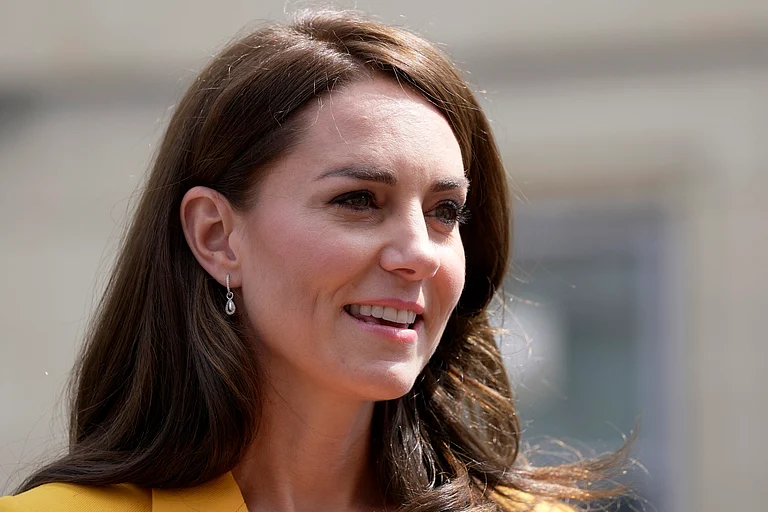King Charles III always wanted a slimmed-down monarchy. But not like this.
The Double Cancer Blow To Kate And King Charles Leaves Britain's Royal Family Depleted And Strained
Princess Catherine’s cancer diagnosis revelation has shaken the world as this news has come just one month after King Charles III’s cancer diagnosis.
The Princess of Wales' disclosure that she has cancer has prompted an outpouring of goodwill for Kate and for a royal family that's now facing two serious health crises. Some of the social media frenzy that has swirled during the princess' absence from public view should now seep away.
But with the king also being treated for an undisclosed form of cancer, and Prince William taking time off to help care for Kate and their children over the Easter school break, the ranks of working royals have been depleted, leaving the monarchy's future suddenly fragile.
“This is a smaller and frailer royal family than Britain is used to,” veteran journalist Andrew Marr wrote in the New Statesman magazine. “It scarcely seems believable that only a decade ago, people were complaining about there being far too many members of it.”
Prince Harry is in California, estranged from brother William. Prince Andrew is in disgrace over his friendship with Jeffrey Epstein. So it falls to Queen Camilla and a few others to be the public face of a monarchy that now has increased public sympathy, but reduced visibility.
“It's a remarkable situation, and a significant moment for the monarchy and the institution so early in the king's reign that two senior figures should be out of action,” said Joe Little, managing editor of Majesty magazine. “The pressure is on a much smaller team.”
Partly in response to gripes that taxpayers were funding a small army of royals, Charles resolved to run a tighter ship when he took the throne in 2022, with a core group of senior family members carrying out most of the work.
The nature of that work may not be apparent, especially to people outside the UK, but it is plentiful. The monarch has no political power but plays a constitutional role that includes signing bills into law and meeting regularly with government ministers.
The king and his children are patrons of many charities, professional bodies and sporting organisations, as well as ceremonial colonels-in-chief of military regiments and dispensers of medals for valour and public achievements.
The most visible royal is now 76-year-old Camilla, who has kept working while her husband is treated for cancer. In recent days she has stood in for Charles on visits to the Isle of Man and Northern Ireland.
The king's sister, 73-year-old Princess Anne, has attended awards ceremonies, receptions and visits as patron of organisations including Save the Children. Prince Edward, at 60 the king's youngest brother, has been in Uganda on royal duties that stretch across the 56-nation Commonwealth of Britain's former colonies.
The engagements help fulfil the maxim of the late Queen Elizabeth II that the royal family must be “seen to be believed”.
“This is a historic monarchy that thrives on interacting with people,” royal historian Robert Hardman told Sky News. “It has to be visible.”
But striking a balance between visibility and privacy has always been tricky. During the late queen's 70-year reign, the British media evolved from deference to a hunger for scoops that saw some tabloids resort to phone hacking and other illegal activity in search of stories.
Press behaviour changed to an extent after the death of Princess Diana in a 1997 car crash while being pursued by photographers. That curbed the use of paparazzi photos, but the relationship between monarchy and media remains an uneasy one. It's openly hostile in the case of Prince Harry, who is suing several newspaper publishers for invasion of privacy.
The palace initially stumbled in its attempt to sate the public desire for information about Kate while maintaining her privacy. A photo of Kate and her children George, Charlotte and Louis released on March 10 to coincide with Mother's Day in the UK backfired when The Associated Press and other news agencies retracted the picture from publication because it appeared to have been manipulated.
There was no suggestion the image was fake, but the slip-up set off even more conjecture.
Claudia Joseph, author of “Kate: The Making of a Princess,” said the Prince and Princess of Wales are social media-savvy, but that dealing with the online world is “a learning curve.”
Joseph said the royal family is still dealing with the “big shock” of Harry and Meghan's departure. Their retreat from royal duties in 2020 -– spurred, they said, by relentless press intrusion and a lack of support from the palace — “depleted the younger ranks.”
Despite that, she said public sympathy and the royals' sense of duty would see the monarchy through its latest crisis.
“Families do get ill, and they do struggle and sometimes people have to take a step back from work,” she said. “I'm sure in six months' time when they have recovered, hopefully, people will forget that they weren't around for a few months.”
In her video message, Kate said that “my work has always brought me a deep sense of joy and I look forward to being back when I am able.”
“But for now, I must focus on making a full recovery,” she said.


